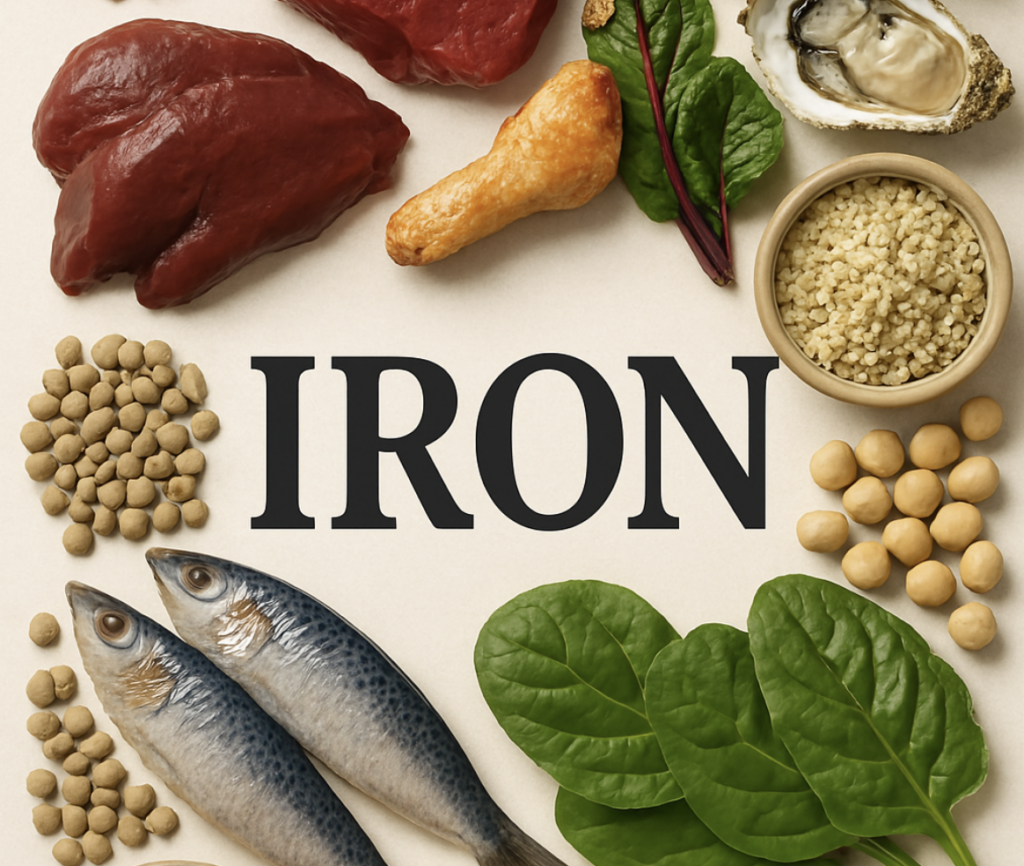Iron is a powerhouse mineral your body depends on to transport oxygen, support energy, and maintain healthy red blood cells. It plays a vital role in everything from brain function and physical performance to immune health. Yet, iron deficiency remains the most common nutrient deficiency in the world—especially among women. In this post, you’ll discover how iron works in the body, signs you might be low, food sources, absorption tips, and when to consider supplements.
What Does Iron Do in the Body?
Iron is a key component of hemoglobin, the protein in red blood cells that carries oxygen from your lungs to tissues throughout your body. It’s also involved in muscle metabolism, cognitive development, and immune defense.

✔ Key Functions of Iron:
- Oxygen delivery through hemoglobin
- Energy production (ATP synthesis)
- Supports immune response and infection defense
- Essential for brain development and focus
- Maintains healthy skin, nails, and hair
💡 Fun Fact: Around 70% of your body’s iron is found in hemoglobin and myoglobin (a protein in muscles).
Top Health Benefits of Iron
✔ 1. Increases Energy and Reduces Fatigue
When iron is low, oxygen delivery is impaired—leading to tiredness, weakness, and poor endurance.
✔ 2. Supports Brain Function and Focus
Iron helps your brain get the oxygen it needs to stay sharp, alert, and mentally clear.
✔ 3. Boosts Immunity
Iron helps your body produce white blood cells and mount a defense against viruses and bacteria.
✔ 4. Supports Healthy Pregnancy
Iron is essential for fetal development and helps prevent premature birth, low birth weight, and maternal fatigue.
✔ 5. Promotes Healthy Hair, Skin, and Nails
Iron supports cellular renewal and oxygenation of skin and scalp tissue.
Signs of Iron Deficiency

⚠️ Common Symptoms:
- Fatigue and weakness
- Shortness of breath during activity
- Pale skin or dark circles under the eyes
- Brittle nails or hair thinning
- Dizziness or headaches
- Brain fog or poor concentration
- Cold hands and feet
💡 Risk Factors:
- Menstruating or pregnant women
- Vegans and vegetarians
- Athletes with high physical demands
- People with digestive issues (e.g., celiac, IBS)
- Frequent blood donors
Best Dietary Sources of Iron
🥩 Heme Iron (animal-based, better absorbed):
- Red meat (beef, lamb)
- Poultry and liver
- Seafood (especially clams, oysters, sardines)
🌱 Non-Heme Iron (plant-based):
- Lentils and chickpeas
- Tofu and tempeh
- Spinach, kale, and beet greens
- Pumpkin seeds and quinoa
- Fortified cereals and grains
💡 Tip: Combine non-heme iron foods with vitamin C (citrus, bell peppers, tomatoes) to dramatically increase absorption.
How to Boost Iron Absorption Naturally
✔ Pair iron-rich foods with vitamin C
✔ Avoid drinking coffee or tea with iron-rich meals (they inhibit absorption)
✔ Cook in a cast iron skillet (can add trace iron to food)
✔ Soak or sprout grains and legumes to reduce phytates (which block iron uptake)
Recommended Daily Intake (RDI)
- Women (19–50): 18 mg/day
- Men (19+): 8 mg/day
- Pregnant women: 27 mg/day
- Postmenopausal women: 8 mg/day
Iron Supplementation
💊 When to Consider Supplements:
- If you’re clinically deficient (confirmed with a blood test)
- During pregnancy
- After major blood loss or surgery
- If dietary intake is insufficient long term
✔ Popular Forms:
- Ferrous sulfate (standard and affordable)
- Ferrous bisglycinate (gentler on digestion)
- Liquid iron (for those with swallowing issues)
⚠️ Watch Out For:
- Nausea, constipation, or stomach upset
- Interference with calcium, zinc, and certain medications
- Iron overload (especially for people with hemochromatosis)
💡 Pro Tip: Take iron supplements on an empty stomach with vitamin C—but not alongside calcium or dairy.
Pros and Cons of Iron
✔ Pros:
- Vital for energy, cognition, and immunity
- Can correct deficiency rapidly through supplements
- Easy to monitor via blood work
⚠️ Cons:
- Too much iron can cause oxidative stress or GI distress
- Interferes with absorption of other nutrients
- Plant-based iron is less bioavailable
Iron may be small in quantity but it’s massive in importance. If you often feel tired, pale, or weak—or fall into a high-risk group—you may want to check your iron status. A mix of smart food choices, proper absorption strategies, and thoughtful supplementation (if needed) can help you stay energized, strong, and focused every day.
Read more on why zinc is essential for your health
Learn more about iron from the NIH Office of Dietary Supplements
